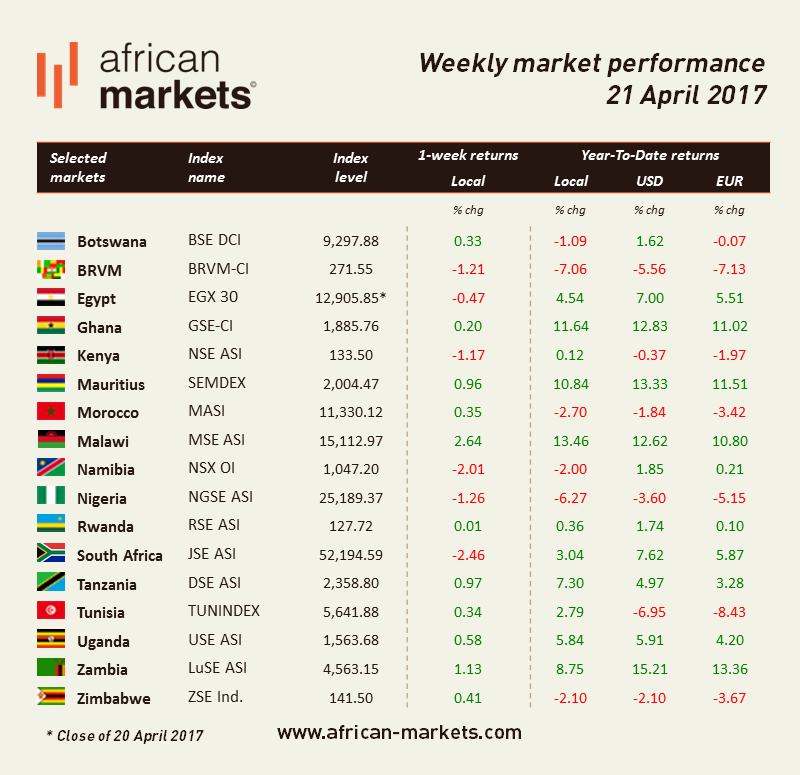The World Bank reviewed downwards its GDP projections for Sub-Saharan Africa from 2.9% to 2.6% due to weaknesses in Angola, Nigeria, and South Africa. The bank namely sees investment growth recovering only gradually because of still tight liquidity in main oil exporters and low investor confidence in South Africa. The World Bank trimmed South Africa’s GDP growth estimate for this year to 0.6% from 1.1%, and increased Nigeria’s to 1.2% from 1%. However, as often in Africa, specifics differ from one country to another.
The JSE lost 2.46%. South Africa’s consumer inflation eased to 6.1% in March from 6.3% in February as the return of rainfall following a severe drought cut into food price inflation. At its last policy meeting, South Africa’s Reserve Bank said it forecast inflation to average 5.9% in 2017 and that it had reached the end of its tightening phase, adding that any rate cuts would depend on data.
Political tensions are intensifying in Zambia since opposition leader Hakainde Hichilema’s arrest on treason charges. As a result, Zambia’s president said he may declare a state of emergency. The LuSe ASI gained 1.13%.
This week, Tunisian Finance Minister declared that Tunisia’s central bank will reduce its interventions to enable the value of the dinar to steadily decline, but it will “a void a brutal devaluation”. This comes as Tunisia is currently negotiating with the IMF. The IMF is pushing Tunisia to improve its finances and reduce public spending, especially public-sector wages, where spending is among the highest in the world compared with GDP. On Monday, the IMF agreed to release a $320 mn tranche of Tunisia’s $2.8 bn in loans. The TUNINDEX gained 0.34%.
The NGSE lost 1.26%. Ecobank shares fell 5% this week as the bank posted a record pretax loss of $131 mn last year, compared with a $205 mn profit in 2015. The bank recorded impairment losses with most of them coming from Nigeria, where the lender was hit by recession, dollar shortages and a severe devaluation of the naira against the U.S. dollar.
Addison, the new governor of Ghana’s central Bank declared that the bank would not finance the government's budget this year. A law was passed last year in the country which gave the right to the central bank to finance the deficit up to 5% of the previous year's tax revenues. According to the governor, the central bank is well-positioned to meet its 2017 inflation target of 11.2% towards the government's medium-term objective of single digit inflation at 8% plus or minus 2% spanning 2018-19. Furthermore, Addison added that the cedi should keep its recent stability against the dollar thanks to the government fiscal policy, improvement in export earnings and reduction in import bills. The GSE gained 0.20%.







































